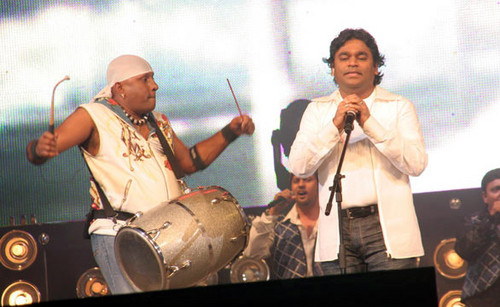Oscar-winning composer AR Rahman and Padma Shri percussionist Sivamani have known each other since childhood. Sivamani knew Rahman before the composer decided to embrace Islam and changed his name from Dilip Kumar to AR Rahman.
AR Rahman and Sivamani met each other through their fathers, who were friends. Sivamani’s father, S.M Anandan was a renowned percussionist and initially was against his son pursuing the life of a musician. AR Rahman’s father, R.K. Shekhar, was a Tamil musician who composed many scores in the Malayalam film industry. Rahman and Sivamani certainly inherited their passion and talent in music from their fathers.
Over the last few decades, the two have worked together to create some of the most iconic film scores, including the Hindi films Roja (1992), Bombay (1995), Taal (1999), Bombay Dreams (2004), Rang De Basanti (2006) and Rockstar (2011).

In a recent interview with O2 India, Sivamani shared the changes he noticed in his friend’s demeanor and focus after he changed his faith.
The story behind AR Rahman’s faith change
It was in the late 1980’s that Dilip Kumar and part of his family decided to change his faith to Islam.
A Sufi spiritual healer had been treating Rahman’s father when he was struggling with cancer. His father passed away within days of the interaction. In a chat with The Glenn Gould Foundation, Rahman shared that the healer had predicted that Rahman and his family would meet him again after 10 years.
Around 10 years later, when Rahman had just started out as an independent music composer, he got stuck in customs while getting studio equipment from Singapore. One of the Sufi saint’s students worked in customs and told the healer that he had seen Rahman. The student helped Rahman to clear customs, after which Rahman went to the Sufi healer to meet him again and thank him.
It was during this meeting that Rahman and his family decided to change their faith. Rahman felt that the saint’s teachings brought peace to his life and that things started falling into place in his professional life.
Was there opposition to AR Rahman’s decision to change faiths?
In his interview, Rahman shared that being a musician allowed him “greater social freedom” and that the southern India population is “open” and “embracing”. He added that India’s equation with religion has changed recently due to the influence of politics.
The changes Sivamani saw in AR Rahman
In his interview with O2, Sivamani went over the process of how he composed the backbone rhythm of songs with Rahman; going over the processes of songs including Kahi Aag Lage Lag Jaaye, Nadaan Parinde and Azeem-O-Shaan Shahenshah.

The renowned percussionist shared how he used to visit the Sufi healer’s shrine along with Rahman and his mother. Rahman studied the Quran at the shrine and “totally changed” as a person once he changed his name. Sivamani stated that his friend developed a new level of focus and was “very calm”. He did not talk while composing music in the studio, made no jokes and was very serious. “It really brought him the discipline,” Sivamani added.
Sivamani also shared that the atmosphere of the studio was “very spiritual”, that there was a prayer heard in the studio before any recording started. He noticed “a very spiritual connect” between his friend and god.



